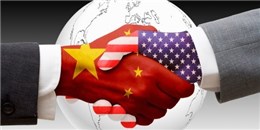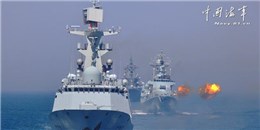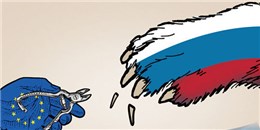Major Power Relations
Your Present Location: PROGRAMS> Major Power Relations-
Xi Jinping`s US visit will highlight China-US economic ties
Chinese President Xi Jinping`s forthcoming state visit to the U.S. offers an opportunity to understand the great potential for mutually beneficial economic relations between the two countries. This goes well beyond them being the world`s two largest economies to revealing their fundamentally complementary economic character.
2015-09-18 -
China seeks synergies in investment in Russia
the first East Economic Forum kicked off in Russia`s Far East hub of Vladivostok, showing that Russia is striving to inject fresh momentum into its economic development, against the background of Western sanctions.
2015-09-15 -
Relations with Washington have moved beyond Cold War shadow
Right before Chinese President Xi Jinping`s upcoming state visit to the US, some negative voices have emerged in the US public opinion, including complaint against the business environment in China, criticism over the draft of China`s new NGO legislation, anxiety toward China`s economic slowdown, and the hype over the situation of the South China Sea. Some are worried about the future of the Sino-US relationship. But in my mind, these are precisely signs that reflect the stability and progress i
2015-09-15 -
South Korea’s Middle-Power Diplomacy
South Korean President Park Geun-hye, despite the opposition of her country’s closest ally, the United States, stood together with Chinese President Xi Jinping in Tiananmen Square to watch the military parade commemorating the 70th anniversary of World War II’s end in Asia. The decision provided the most visible image yet of an emerging China-South Korea concert, one that China believes may prevent the region from sliding into cold war.
2015-09-10 -
EU needs judgment independent from US
The worsening refugee crisis indicates that chaos in the EU`s neighborhood is jeopardizing the long-term interests of the EU, and the situation is very likely to grow worse.
2015-09-09 -
China and advanced economies – a win-win relationship
As the Organization for Economic Cooperation and Development is the global institution for advanced economies, Chinese Premier Li Keqiang took advantage of a meeting at its Paris headquarters to offer a strategic overview on relations between China and these countries. The importance of the issues addressed reflects current key trends in the global economy.
2015-08-26 -

China, U.S. seek new military relationship for greater good
The Chinese military expects to avoid misunderstandings and miscalculations with the U.S. side, and to maintain non-interrupted interactions with the Pentagon. Accordingly, the U.S. side should act in a more cooperative manner rather than engaging in provocative actions such as selling more advanced weapons to Taiwan and carrying out unrestricted military actions in the South China Sea.
2015-06-24 -

United States should cease playing with fire in South China Sea
The fifth article of the Declaration on the Conduct of Parties in the South China Sea states “Parties undertake to exercise self-restraint in the conduct of activities that would complicate or escalate disputes and affect peace and stability including, among others, refraining from action of inhabiting on the presently uninhabited islands, reefs, shoals, cays, and other features and to handle their differences in a constructive manner.”
2015-06-24 -

Sanction game against Russia doomed to fail
EU Foreign ministers in Brussels on January 29 extended the Russian blacklist for six months, promised to add extra names, and began preparations for a fresh round of economic sanctions. The new names - individuals and entities - are to be added by February 9 at the latest. The EU called the snap meeting after a rocket attack on Mariupol which killed 30 civilians.
2015-02-03 -

New Delhi-Beijing cooperation key to building an ‘Indo-Pacific Era’
In recent years, the geopolitical concept of the "Indo-Pacific" has gained currency. The concept was first developed by Australian scholars and promoted by Americans after the Obama administration put forward the strategic rebalance toward the Asia-Pacific.Now, more and more scholars and officials have begun to use this term, fleshing it out from their own perspectives.
2014-12-01 -

Beijing offers manufacturing lesson to Delhi
The "Make in India" campaign, launched by Indian Prime Minister Narendra Modi with the purpose of turning India into a new global manufacturing center, now has come into full swing.Regarding India`s ambition, what Beijing needs to do is make concerted efforts to upgrade its products and the quality of "made in China" commodities to march toward the high end of the value chain.
2014-11-24 -

Mutual trust a priority for Beijing-Tokyo ties
The four point agreement that China and Japan reached right before the leaders from the two sides met on the sidelines of the Asia-Pacific Economic Cooperation (APEC) Economic Leaders` Meeting on November 10 took many by surprise. Not long before the agreement, the Japanese government took a host of assertive actions, including denying the 1993 Kono Statement and claiming it has no agreement with China preventing the prime minister from visiting the Yasukuni Shrine.
2014-11-19
























































































 京公网安备 11010802037854号
京公网安备 11010802037854号





